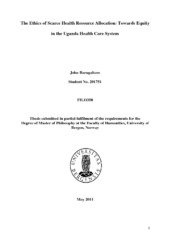The Ethics of scarce health resource allocation: Towards equity in the Uganda health care system
Master thesis
Permanent lenke
https://hdl.handle.net/1956/4984Utgivelsesdato
2011-05-13Metadata
Vis full innførselSamlinger
- Department of Philosophy [240]
Sammendrag
The central ideas in this work are health as a moral entitlement and equity in health. It is a discourse on distributive justice in health and takes Uganda as a case study. It describes Uganda health system especially the extent and distribution of health-related injustice brought about by severe poverty and the manner health resources are raised and allocated. This manner disproportionately adversely affects the poor's access to health services and endangers their livelihoods due to catastrophic health expenditure. This work further critically reviews the theory of utilitarianism (QALYS) which is popularly used in the allocation of scarce health resources. Utilitarianism is accepted as good for ensuring efficiency in health resource allocation, but not good enough to ensure equity in health. This being the case a discussion of other ethical principles of health resource allocation that attempt to close the 'fairness gap' left by the theory of utilitarianism becomes necessary. Having critically examined QALYs and other moral principles, it emerges that a discourse on these per se is good but not good enough to guarantee equity in health in Uganda, even if a harmony between these suggestions were found. The main reason for this is that the said discourse is based on a subtle, yet wrong assumption, that all health services in Uganda are financed by the state and therefore health equity would be achieved if those resources are equitably distributed. This assumption ignores the fact that due to severe poverty and a very steep social gradient, out-of-pocket payment for health services is a prohibitive factor in the use of private health services. This leads to unequal access to health services between social classes since 50% of health out-put is from the private health service providers, hence must be paid for. This points to the fact that there is a strong spiral cause relationship between poverty and health inequity, the fact that is ignored in the discourse on QALYs and other allocation principles that aim at health equity. Therefore, since the poor are disproportionately adversely affected in the current system, developing an equitable financing mechanism for the health care system which takes into consideration the special needs of the poor should be a key priority in Uganda. Den sentrale ideer i dette arbeidet er helse som en moralsk rett og egenkapital i helse. Det er en diskurs om rettferdig fordeling i helse og tar Uganda som en casestudie. Den beskriver Uganda helsevesenet spesielt omfanget og distribusjon av helse-relaterte urettferdigheten skapt av alvorlig fattigdom, og den måte helseressurser er hevet og fordeles. Denne måten uforholdsmessig negativt påvirker de fattiges tilgang til helsetjenester og truer livsgrunnlaget på grunn av katastrofale helseutgifter. Dette arbeidet videre vurderinger kritisk teorien om utilitarisme (QALYs) som er populært brukt i fordelingen av knappe helseressurser. Utilitarisme er akseptert som bra for å sikre effektivitet i helse ressursfordeling, men ikke gode nok til å sikre egenkapitalen i helse. Dette blir tilfelle en diskusjon av andre etiske prinsipper for helse ressursfordeling som prøver å lukke 'fairness gapet "til venstre ved teorien om utilitarisme blir nødvendig. Å ha kritisk undersøkt QALYs og andre moralske prinsipper, framgår det at en diskurs på disse i seg selv er bra men ikke god nok til å garantere egenkapitalen i helse i Uganda, selv om en harmoni mellom disse forslagene ble funnet. Hovedårsaken til dette er at nevnte diskursen er basert på en subtil, men likevel feil forutsetning, at alle helsetjenester i Uganda er finansiert av staten, og dermed helse egenkapital ville oppnås dersom disse ressursene blir rettferdig fordelt. Denne antakelsen overser det faktum at på grunn av alvorlig fattigdom og en veldig bratt sosial gradient, ut-av-lomme betaling for helsetjenester er en uoverkommelige faktor i bruk av private helsetjenester. Dette fører til ulik tilgang til helsetjenester mellom sosiale klasser siden 50% av helse-utgang er fra det private helsevesenet tilbydere, dermed må betales for. Dette peker på det faktum at det er en sterk spiral årsak sammenhengen mellom fattigdom og helse urettferdighet, det faktum som er oversett i diskursen om QALYs og andre tildeling prinsipper som tar sikte på helse egenkapital. Derfor er fordi de fattige uforholdsmessig negativt påvirket i dagens system, utvikle en rettferdig finansiering mekanisme for helsevesenet som tar hensyn til de spesielle behovene til de fattige bør være en prioritet i Uganda.
